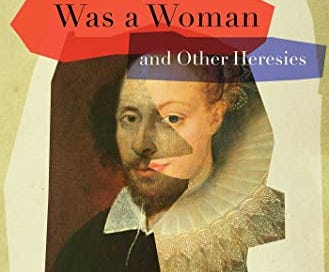Intellectual Freedom and the Debate Over the Identity of "Shakespeare"
New book brilliantly exposes one of the academy's biggest taboos. PLUS: Using the ACRL Framework for Information Literacy to analyze the rhetoric that makes this such a polarizing debate.
In June of 2019, the Atlantic magazine featured an essay entitled “Was Shakespeare a Woman?” by American journalist Elizabeth Winkler. In it, Winkler summarized the long history of doubt regarding the attribution of the plays and poems to the apparently unqualified grain merchant of Stratford-upon-Avon. She then made the case — given the many rich female characters in the Shakespeare canon — that the poet Emilia Bassano might be a potential alternative candidate for their authorship.
The reactions from many major media outlets and over social media were swift and often hostile, with some condemning Winkler for peddling a “conspiracy theory.” Winkler was totally taken aback by the response, as was an editor at the Atlantic, who indicated to her that they never wanted to touch the subject again.
But Winkler was not deterred — and not only because her article would go on to be selected for inclusion in the book The Best American Essays [of] 2020. As a journalist, she realized there must be something larger at work fuelling the firestorm she’d experienced. Her resulting investigation, Shakespeare Was a Woman and Other Heresies, brilliantly combines literary criticism and journalism to expose the social, cultural and institutional dimensions of the taboo against questioning Shakespeare’s identity.
A prolific and respected journalist and critic whose work has appeared in such major outlets as the Economist, the New Yorker, the Wall Street Journal and the Times Literary Supplement, Winkler deftly combines her professional experience with a graduate education in English literature, revealing herself to be as comfortable analyzing Elizabethan-era allusions as she is in conducting probing interviews with sometimes reluctant subjects.
Winkler’s book is an engrossing and highly accessible introduction to a debate that most Shakespearean institutions — and surely English departments more generally — wish would just go away. She provides considerable and compelling detail regarding the case against the traditional biography of Shakespeare, and the search for authors who could have more plausibly written the most sophisticated and beautiful literature in the English canon, including Sir Francis Bacon, Christopher Marlowe, Mary Sidney and Edward de Vere, the 17th Earl of Oxford.
Yet, this is no dry academic text: Winkler ably brings the reader along on her intriguing quest for answers, which includes interviews with some of the field’s leading experts on all sides of the debate, including Sir Stanley Wells, eminent scholar and honorary president of the Shakespeare Birthplace Trust; Mark Rylance, the first artistic director of Shakespeare’s Globe Theatre in London; and Alexander Waugh, noted British literary critic and outspoken advocate for the Earl of Oxford.
In the course of her investigation, Winkler uncovers a host of unanswered questions: Why does Shakespeare tell readers in the sonnets that he knows he himself will be forgotten, but that his works will live forever? Why have no biographers been able to credibly explain how Shakespeare was able to write so expertly about so many fields while having had very little education? Why are the references to Shakespeare from the time so cryptic, as if their authors were sharing some kind of secret?
The authorship skeptics she interviews all have thought-provoking responses to these (and many other) questions, making for fascinating and often delightful reading. However, things turn decidedly uncomfortable — and frankly embarrassing — when these same questions are put to orthodox Shakespeare scholars, who can only insist they’ve never given such matters any thought.
This stark contrast between the open, informed inquiry of doubters and the closed-minded, resolute obstruction of credentialed experts is quite troubling, and impossible to dismiss or ignore. Shakespeare Was a Woman may represent something of an “emperor-has-no-clothes” moment for academia, for it reveals a startling absence at the centre of western literary culture which few of its professed leaders seem willing to confront.
[This review was originally published in the Winnipeg Free Press, May 20th, 2023. For more on the nature of the Shakespeare authorship debate, and the extremely polarizing rhetoric involved, check out the presentation I gave on this theme for HxA which was posted to YouTube back in May of 2021, in which I apply the ACRL Framework for Information Literacy for Higher Education to exemplary statements from Shakespeare scholars. This talk was based on my peer-reviewed book chapter, “With Swinish Phrase Soiling Their Addition: Epistemic Injustice, Academic Freedom and the Shakespeare Authorship Question,” which was published in November 2020 in the book Teaching and Learning Practices for Academic Freedom. An open-access, pre-publication version is available at my institutional repository, Winnspace].
To promote viewpoint diversity, Heterodoxy in the Stacks invites constructive dissent and disagreement in the form of guest posts. While articles published on Heterodoxy in the Stacks are not peer- or editorially-reviewed, all posts must model the HxA Way. Content is attributed to the individual contributor(s).
To submit an article for Heterodoxy in the Stacks, send an email with the article title, author name, and article document to hxlibsstack@gmail.com. Unless otherwise requested, the commenting feature will be on. Thank you for joining the conversation!




Her book sounds fascinating!
And Michael Dudley's review is also fabulous!